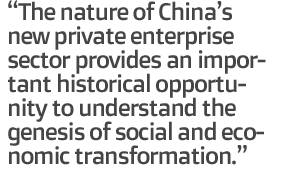
A quest to explain institutional change that gave rise to a new economic order is complex and challenging. Here we report the results of an ongoing research project in China’s Yangzi delta region that aims to do just this.
At the core of our project is the search for general mechanisms and driving forces behind China’s emerging free enterprise economy. Chinese entrepreneurial success is an anomaly. China lacks many of the conditions economists argue are necessary for private-sector economic growth. Yet private entrepreneurs and firms have emerged as the most dynamic forces in the making of China’s economic development. Clearly, the nature of China’s new private enterprise sector provides an important historical opportunity to understand the genesis of social and economic transformation.

A duality of agency and social structure organizes our narrative:
Entrepreneurs are the central agents who drive institutional innovations enabling economic development. Attracted by the apparent economic success of the pioneering entrepreneurs, followers— at first, neighbors and friends, and later employees and distant observers— entered the market at an accelerating pace. Rudimentary business norms evolved and diffused across the region. With a steadily growing pool of entrepreneurs following the same norms, a self-reinforcing process of market entry of private firms developed, drawing in an expanding circle of new entrepreneurs from increasingly mainstream social backgrounds. As private enterprise gained in legitimacy and uncertainties declined, technical and managerial staff were increasingly willing to leave their jobs in state-owned enterprises and government for new job opportunities in the private sector.

Only many years later was legislation such as China’s first “Property Rights Law” enacted, and an ensemble of other legal rules and institutions extended legitimacy to private enterprise as an organizational form. This sequence—bottom-up institutional change reflected in the rise of informal norms of business practices, followed by changes in the formal rules to secure and consolidate the gains in economic performance already in place—is at the core of China’s economic transformation.
